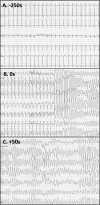Capecitabine-induced-coronary-vasospasm leading to polymorphic ventricular tachycardia and cardiac arrest
- PMID: 38414072
- PMCID: PMC10898064
- DOI: 10.1186/s40959-024-00214-4
Capecitabine-induced-coronary-vasospasm leading to polymorphic ventricular tachycardia and cardiac arrest
Abstract
Capecitabine, a pro-drug of 5-fluorouracil, is commonly used in the treatment of breast and colorectal cancer. Its side effects, including nausea, vomiting, diarrhea, fatigue, loss of appetite, and bone marrow suppression, are well recognized. However, coronary vasospasm represents a less commonly recognized but significant complication of fluoropyrimidine-based therapies such as capecitabine. Proposed mechanisms for this adverse effect complication include direct endothelium-independent vasoconstriction, activation of protein kinase C, and activation of the cyclooxygenase pathway. In this report, we present a case of capecitabine-induced coronary vasospasm leading to progressive, focal ST-elevations, myocardial ischemia, and subsequently polymorphic ventricular tachycardia. These events were captured on telemetry, in a male in his early 40s, diagnosed with stage IIIB sigmoid colon cancer. Notably, the patient had no pre-existing coronary artery disease or other cardiovascular risk factors. Upon diagnosis, the patient was initiated on a calcium channel blocker, verapamil, to mitigate further coronary vasospasm events. After thorough discussions that prioritized the patient's input and values, an implantable cardioverter-defibrillator was placed subcutaneously. Following discharge, the patient restarted capecitabine therapy along with verapamil prophylaxis and did not experience any subsequent shocks from his ICD as assessed during his outpatient follow-up visits. This case emphasizes the need to involve patients in decision-making processes, especially when managing unexpected and serious complications, to ensure treatments align with their quality of life and personal preferences.
Keywords: Capecitabine; Colorectal carcinoma; Coronary vasospasm; Polymorphic ventricular tachycardia.
© 2024. The Author(s).
Conflict of interest statement
The authors declare no competing interests.
Figures


References
LinkOut - more resources
Full Text Sources
